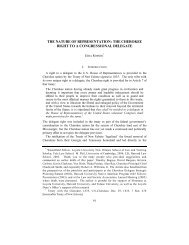Climbing Above the Culture Clash
Climbing Above the Culture Clash
Climbing Above the Culture Clash
You also want an ePaper? Increase the reach of your titles
YUMPU automatically turns print PDFs into web optimized ePapers that Google loves.
Frankel attributes <strong>the</strong> erosion of trust<br />
to a fundamental shift in business<br />
culture that began with <strong>the</strong> deregulation<br />
frenzy of <strong>the</strong> 1980s, which was<br />
based on <strong>the</strong> faulty assumption that<br />
markets can regulate <strong>the</strong>mselves.<br />
“There was a growing hostility toward<br />
<strong>the</strong> law and a growing admiration<br />
for innovation, regardless of what<br />
that innovation was aimed at,” said<br />
Frankel. “So <strong>the</strong> business world became<br />
increasingly focused on innovating<br />
loopholes — actions that would be<br />
considered immoral in ano<strong>the</strong>r climate,<br />
but do not violate <strong>the</strong> precise letter<br />
of <strong>the</strong> law. In our current financial<br />
culture, morality is considered stupid:<br />
‘If you have an opportunity to grab<br />
and you don’t, you’re a fool.’”<br />
Over time, even <strong>the</strong> regulators got<br />
drawn into this culture, adopting an<br />
“everybody’s doing it” attitude, which led<br />
<strong>the</strong>m to overlook minor irregularities.<br />
As a result, understandings of what<br />
constituted actionable dishonesty<br />
became elastic and, as we are now<br />
painfully aware, that elasticity ultimately<br />
stretched beyond <strong>the</strong> breaking point.<br />
“We have created a culture based on<br />
<strong>the</strong> belief that ‘Whatever is good for<br />
private persons who hold power over<br />
o<strong>the</strong>rs is good for <strong>the</strong> country,’” said<br />
Frankel. “Yet power over o<strong>the</strong>rs, whe<strong>the</strong>r<br />
by <strong>the</strong> government or by <strong>the</strong> private<br />
sector, must be balanced. That culture of<br />
‘freedom for power-holders’ is still here.<br />
You don’t create a culture in one day, and<br />
you don’t change a culture in one day.”<br />
Frankel states that private powerholders<br />
are very important to balance<br />
government power. And so is <strong>the</strong> reverse.<br />
Her prescription for change is to create<br />
a regulatory system that will enable<br />
regulators to know more about <strong>the</strong><br />
markets, and <strong>the</strong>n act before <strong>the</strong> system<br />
is threatened. According to Frankel, <strong>the</strong><br />
SEC should shift its resources to teams<br />
of specialized financial examiners who<br />
have <strong>the</strong> expertise required to catch<br />
dishonest behavior before it becomes<br />
pervasive. The activity of <strong>the</strong>se examiners<br />
should be most intense during times of<br />
rapid growth, when innovative abuses<br />
are more likely to occur, ra<strong>the</strong>r than<br />
reacting after major institutions crash.<br />
Frankel recalled that during her year<br />
and a half at <strong>the</strong> SEC she was struck<br />
by how little <strong>the</strong> agency knew about<br />
developments in <strong>the</strong> financial markets,<br />
where <strong>the</strong> innovations were coming<br />
from and where <strong>the</strong>y were heading.<br />
“The way to change <strong>the</strong> current<br />
culture is to closely follow what <strong>the</strong><br />
market is doing, and find out what <strong>the</strong><br />
real problems are,” she explained.<br />
Now in her 80s, Frankel shows no signs<br />
of slowing down. Over <strong>the</strong> years she<br />
has published more than 60 articles<br />
and book chapters, including two<br />
books in <strong>the</strong> past two years: a teaching<br />
book on Fiduciary Law and a case law<br />
companion to her prophetic 2006 book,<br />
Trust and Honesty: America’s Business<br />
<strong>Culture</strong> at a Crossroad. She is currently<br />
at work on a case-based teaching book<br />
on securitization with co-author Mark<br />
Fagan, a short book on con artists and<br />
<strong>the</strong>ir victims, a book on <strong>the</strong> <strong>the</strong>ory of<br />
fiduciary duties for Oxford University<br />
Press, and an article on fiduciary duties<br />
of financial brokers. She is regularly<br />
quoted in <strong>the</strong> national media.<br />
But Frankel’s proudest accomplishment<br />
of late has been <strong>the</strong> creation of a<br />
multidisciplinary course that exposes<br />
BU Law students to real ethical<br />
dilemmas in <strong>the</strong> business world. The<br />
class is designed to show how fraud<br />
and dishonesty evolve, even among<br />
those who don’t necessarily set out to<br />
become con artists. Students study <strong>the</strong><br />
unfolding of <strong>the</strong> Enron and WorldCom<br />
scandals; <strong>the</strong> fall of accounting giant<br />
E.F. Hutton; and <strong>the</strong> life of <strong>the</strong> man<br />
whose name has become synonymous<br />
with large-scale fraud, Charles Ponzi.<br />
Ponzi is a particularly powerful teaching<br />
case because, as Frankel’s students<br />
discover, <strong>the</strong> legendary swindler actually<br />
started out with a legitimate strategy to<br />
profit legally from unstable exchange<br />
rates between countries. It wasn’t<br />
until his get-rich-quick plan failed<br />
that he developed his now-infamous<br />
pyramid scheme. Frankel uses <strong>the</strong> case<br />
study to demonstrate that <strong>the</strong>re is no<br />
bright line between a Ponzi scheme<br />
and a legitimate business model.<br />
“American corporations pay dividends<br />
on one hand, while borrowing money<br />
or refinancing to pay those dividends.<br />
It’s a model that is very close to a Ponzi<br />
scheme,” she said. “It’s a slippery slope.<br />
It’s not black and white. Through<br />
our discussions and role plays, <strong>the</strong><br />
students begin to understand that.”<br />
Frankel said that student responses to<br />
<strong>the</strong> course have been overwhelmingly<br />
positive, especially about <strong>the</strong> realworld<br />
applications it offers. Said<br />
Frankel, “Students wrote that <strong>the</strong>y<br />
valued <strong>the</strong> course highly because<br />
<strong>the</strong>y learned <strong>the</strong> relationship between<br />
<strong>the</strong> law and <strong>the</strong> outside world in<br />
which <strong>the</strong>y will practice.” •<br />
10 | Boston University School of Law | www.bu.edu/law









